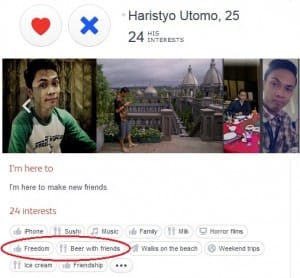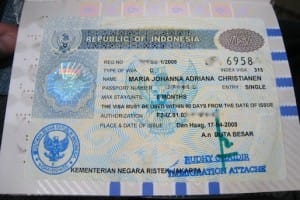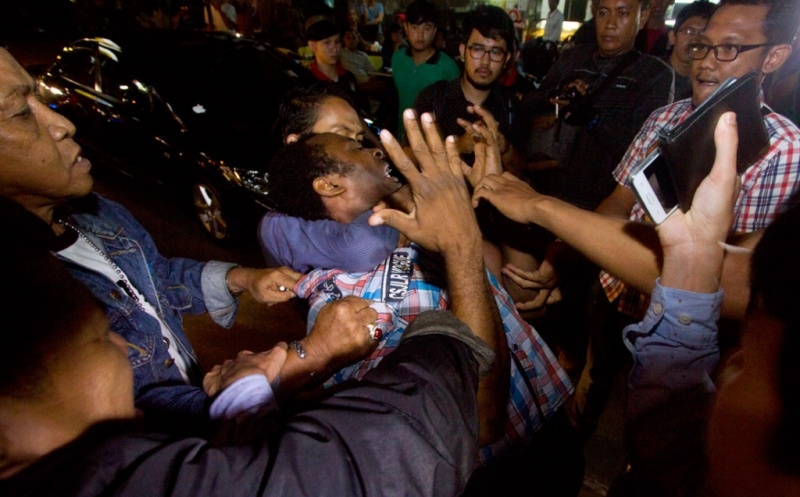Carrying a photocopy of your passport, KITAS or KITAP in Indonesia may no longer be good enough if you don’t want to be treated like a criminal by overzealous Immigration officers.
It’s just after 9pm on a Tuesday night. Two teams of Immigration and military officers, most of them dressed in plainclothes, descend on Jakarta’s backpacker strip, Jalan Jaksa. They are seeking foreigners not carrying passports or residency permits. Numerous TV crews have been brought along to film the raid.
Officers begin entering the street’s cheap cafes and bars, demanding to see original documents. The TV crews get some action when an American male without his passport shouts “What the f— is this?” as he is roughly dragged away by four officers.
When the bewildered man cries out for his brother to come, a diminutive but aggressive uniformed Immigration officer named Haristyo Utomo leaps forward and wraps his arms around the American’s neck, pulling his head backward. Another officer yells: “Shut up! Shut up! Stop shouting!”
There’s more action when a burly Nigerian attempts to run away, but is caught by the officers. When an officer takes his wallet, he protests, only to be put in a stranglehold by Haristyo Utomo and pulled to the ground. Fired up on adrenaline, Haristyo maintains his hold and screams: “You want fighting me? Huh? Huh? You want fighting me?”
The Nigerian responds: “No, no. I no fighting.” He is then handcuffed by officers led by Central Jakarta Immigration Office’s head of Immigration Control, Vodka Yosa Anggara, who later proudly chats with reporters.
Media coverage of the Jaksa raid was incompetent at best and racist at worst. “Several foreign citizens went on a drunken rampage when Immigration officials raided Jalan Jaksa,” claimed RTV. The Kompas daily reported that the American had to be restrained to prevent him from escaping – even though he wasn’t trying to escape. Other reports asserted that illegal foreigners were drunk and out of control.
The Jakarta portal of trendy online news network Coconuts.co claimed the Nigerian “resisted and tried to escape the whole time”. Coconuts erroneously quoted Kompas as saying the Nigerian yelled “You want to fight me?” when officers tried to handcuff him. Not true. The Kompas report correctly stated it was the official who was asking for a fight.
The foreigners apprehended on Jaksa had just been enjoying beers with friends. Ironically, the pugnacious Haristyo, in his profile on online dating network Badoo, lists his interests as “beer with friends” and “freedom”.
An Australian working as a consultant in Jakarta reacted to the May 5 raid by saying: “I always carry a photocopy of my passport to avoid this kind of thing.” Many expatriates feel the same way: a photocopy will keep them out of trouble.
The fact is, some of those detained during the raid were carrying copies of their passports. John (not his real name), a British retiree in his 60s, was with some friends at a Jaksa bar when the raid occurred.
“The officers were all wearing smart casuals. I thought they had come in to watch the football. Then they started demanding to see passports. They were threatening and abusive.”
John, who is in Indonesia on a tourist visa, showed them a laminated, colour photocopy of his passport’s main data page. It was deemed insufficient. Another man at the table had a copy of his long-term residency permit (KITAP). This was also not good enough. The two men and six other foreigners were bundled into two vehicles and taken to the fourth floor of Central Jakarta Immigration Office in Kemayoran. Most were soon released after friends or spouses arrived with their passports.
The Nigerian and John were not so lucky. The Nigerian had overstayed, while John was not allowed to collect his passport from his rented house. One detainee recalls the Nigerian was taken to a separate room. Shouting was heard and then a group of officers stormed into the room. There was much more noise, then silence.
John said officers kept asking who would “sponsor” him. He was eventually told to enter a lift because an interpreter from the British Embassy was waiting for him downstairs. It was a ruse. John was locked up in a cell and told he would be released the following morning. But nothing happened, so he called an Indonesian friend to come and collect his house key and then bring his passport. The friend, Adam (not his real name), arrived at Immigration after work at 5.30pm Wednesday and was tersely informed the office had closed for the day. When he insisted on seeing John, he was told the officer with the keys to the cells had already gone home. If that’s true, then Immigration was endangering the lives of inmates in the event of a fire or any other disaster.
Adam returned at 8am Thursday, only to be informed: “The man with the keys to the cells has not yet arrived so come back at about 10am.” He returned at 9.55am, finally collected John’s key, went to the house, found the passport and rushed back at about 11.30am. He was told John would be released at 2pm Friday. Why not sooner? Immigration now had his original passport containing a valid visa, so why keep him incarcerated like a criminal? The official reason: officers wanted to type up a letter for John to sign, promising to carry his original passport. Most people can type a simple letter in under an hour. Not Central Jakarta Immigration Office. Adam was asked to pay Rp.6 million to secure John’s release. He refused. John was eventually freed after three nights behind bars. “I don’t know what happened to the Nigerian,” he says. “There were a lot of Cameroonians in the cell next to mine and they didn’t have anyone to help them.”
The Jaksa raids were part of a sweep conducted by 120 Immigration offices across Indonesia over May 5–7, netting 1,069 foreigners. The aim was to crack down on terrorism, drug smuggling and dealing, and to ensure that foreigners abide by Immigration regulations.
Such raids are nothing new, although the targets in the past were predominantly Africans and Chinese. Now, everyone is fair game. Koreans, Japanese, Middle Easterners, Europeans and Australians have all been nabbed and several claimed they had to pay to be released. Officers seem to be especially fond of raiding apartments of foreign women suspected of working as prostitutes.
One perennial question that emerges after such raids is: Do foreigners have to carry their original passport or residency permit at all times in Indonesia? A moderator on the popular Living in Indonesia – Expat Forum in May posted: “Not having a passport to produce on the spot is not (and has never been) an offense.” He cited Article 91(2) of Law No. 23 of 2006 on Population Administration, which states that: “Every foreigner who has a Limited Residency Permit … who travels without a Certificate of Domicile will face a maximum administrative fine of Rp.100,000.”
In other words, if you have a KITAS (short-term residency permit) and you’re not carrying it or a domicile certificate, you can be fined a small amount.
But that doesn’t mention anything about tourist visas or passports. Instead, we need to look at Law No.6 of 2011 on Immigration. Article 71(b) of the law states that every foreigner present in Indonesia is obliged to: “Show and submit any travel document or stay permit they possess when required to do so by an active Immigration officer in the interests of Immigration control.”
Violators of Article 71 face a maximum penalty of three months in jail or a maximum fine of Rp.25 million. Article 119 states that foreigners who enter and/or are in Indonesia without a valid travel document and visa face a maximum of five years in jail or a fine of up to Rp500 million.
So we must always carry either a passport, KITAS, KITAP or KTP-Asing (residency card for foreigners). Should these be originals or photocopies? The law does not explicitly say so, but given the recent raids, photocopies and scans are not enough.
In which case, it’s high time for countries such as the UK to update their travel advice for Indonesia. The UK Government advises: “Carry a photocopy of the relevant pages of your passport and copy of your arrival card for identification purposes and keep the original documents in a safe place.”
Indonesia’s arrival/departure card, once mandatory for all foreigners entering and leaving the country, was scrapped in April. A strange move, as it makes it harder for the Government to know where foreigners will be staying and the purpose of their visits.
As for Immigration raids, much comes down to a foreigner’s attitude. Always be polite, friendly and cooperative. Establish a respectful rapport with Indonesian officials and you’ll find there’s less risk of being treated like a criminal.
Plenty of Indonesian expats in the US suffered tough treatment in raids following the 9/11 attacks. Western expats in Indonesia are lucky insofar as it’s usually easy to find a solution to administrative infractions. Most Indonesian officials are friendly at heart, provided we don’t antagonize them.
To watch the video of the Immigration raid on Jalan Jaksa, click here.




